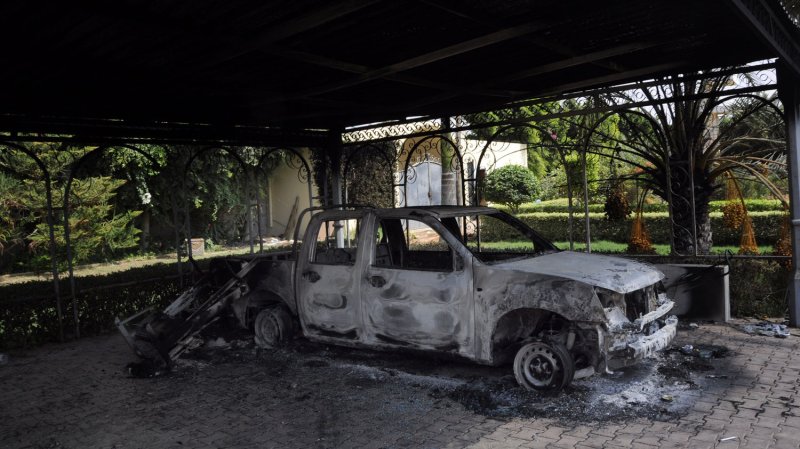A burnt building is seen at the United States consulate, one day after armed men stormed the compound and killed the U.S. Ambassador Christopher Stevens and three others in Benghazi, Libya on September 12, 2012. UPI/Tariq AL-hun |
License Photo
WASHINGTON, March 5 (UPI) -- U.S. officials still lack a full understanding about who orchestrated and carried out the deadly attack on the U.S. Consulate in Libya, officials said.
While investigators of the joint CIA-FBI effort have identified several people present during the terrorist attacks on the consulate in Benghazi in which Ambassador Christopher Stevens and three other diplomatic employees were killed, none has been tied to the deaths with certainty, the Los Angeles Times reported Monday.
"It is going painfully slowly," said Rep. Adam B. Schiff, D-Calif., a member of the House Intelligence Committee who was briefed on the investigation. "We don't have access to all the people we'd like to have access to."
Republican congressional members have charged the White House didn't adequately anticipate or respond to the violence on Sept. 11, which delayed the confirmation of Obama's pick for CIA director, John Brennan, for several weeks. The Senate Intelligence Committee scheduled a closed-door vote Tuesday on Brennan's nomination, and the Senate is expected to confirm his appointment this week.
Officials gave several reasons for the slow-moving investigation to the Times.
They say the nature of the Benghazi attacks -- a combination of terrorist action and mob violence -- has been difficult to sort through and U.S. investigators can't openly collect evidence or find witnesses in Benghazi.
Also, new governments in Libya, Tunisia and Egypt are less capable and more unwilling to cooperate than U.S. officials had hoped, officials told the Times.
U.S. officials identified is Ahmed Abu Khattala, an Islamic cleric considered a leader of the extremist Ansar al-Sharia, as a leading suspect. In October, he told reporters he was present during the attack but denied allegations he was observed directing the militants.
The FBI has not interviewed him, the Times said.
Another suspect, Ali Ani Harzi, was arrested in October in Turkey at the request of the CIA and returned to his home country of Tunisia. FBI agents interviewed Harzi in front of a judge for several hours, but in January he was released for insufficient evidence.
U.S. investigators haven't been allowed to interview a third suspect, Islamist militant Muhamed Jamal Abu Ahmed, who was arrested in Egypt in December with help from U.S. intelligence, the Times said. U.S. officials said they think some of Ahmed's associates were at the Benghazi attack but his role is unclear.















